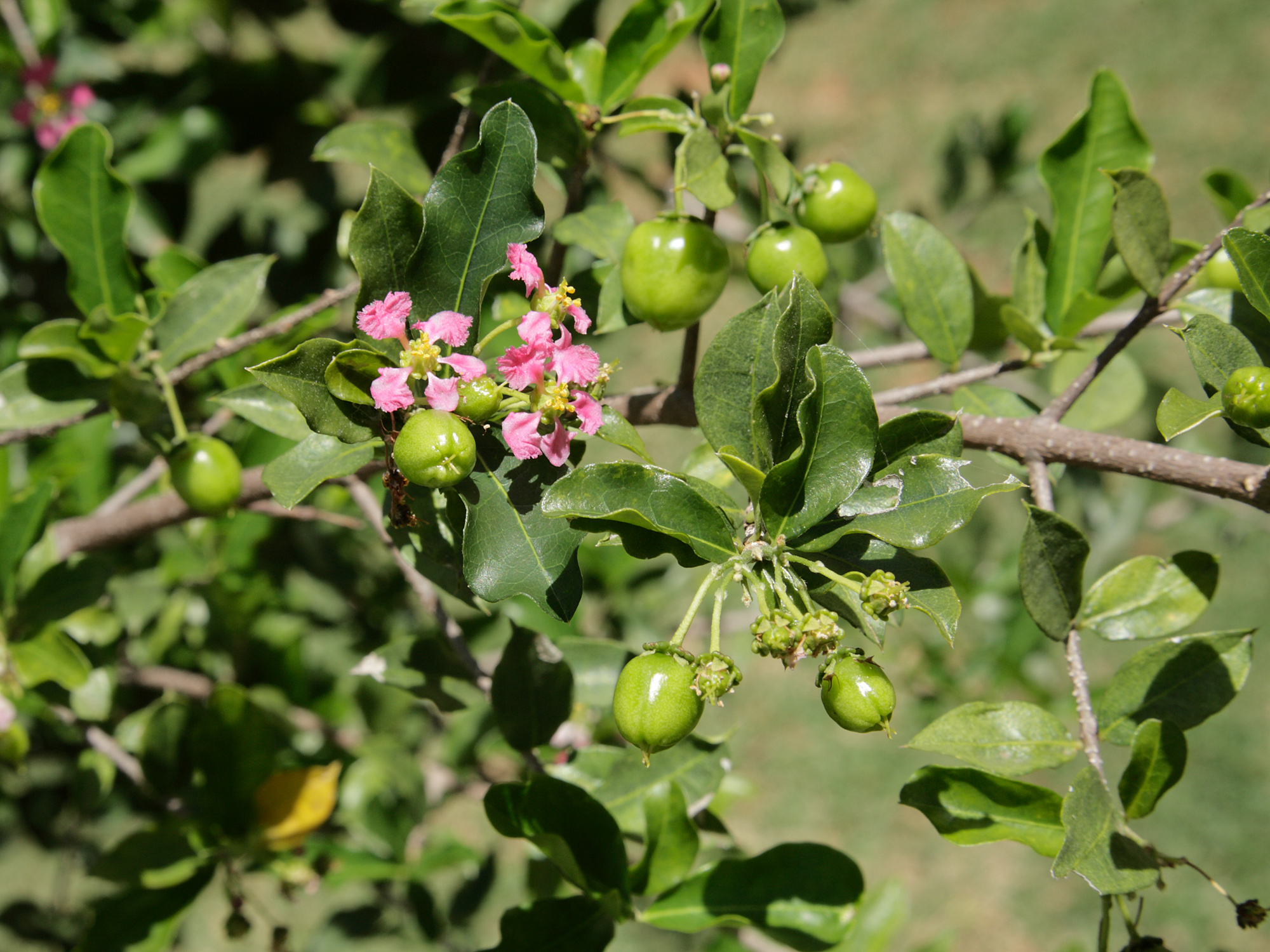Common Names and Other Names:
- Acerola Cherry
- Barbados Cherry
- West Indian Cherry
- Wild Crapemyrtle
Where Does It Occur:
Acerola cherry is native to the tropical regions of the Western Hemisphere, particularly in Central America, South America, and the Caribbean. Countries where it naturally occurs and is cultivated include:
- Brazil
- Mexico
- Puerto Rico
- Jamaica
- Barbados
The plant thrives in warm, tropical climates and is often found in sandy or well-drained soils. It has also been introduced to other regions with suitable climates, such as parts of Florida and Texas in the United States.
Basic Ingredients (Nutritional Profile):
Acerola cherries are renowned for their exceptionally high vitamin C content but also contain other vital nutrients:
- Vitamins:
- Vitamin C (Ascorbic Acid): One of the richest natural sources; can contain up to 65 times more vitamin C than an orange.
- Vitamin A (Beta-carotene)
- B Vitamins: Including B1 (Thiamine), B2 (Riboflavin), B3 (Niacin), and B5 (Pantothenic Acid)
- Minerals:
- Calcium
- Iron
- Magnesium
- Potassium
- Phosphorus
- Antioxidants:
- Polyphenols
- Flavonoids
- Anthocyanins
- Dietary Fiber
- Amino Acids:
- Essential amino acids such as lysine.
Most Commonly Used For Treatment Of:
- Immune System Support:
- High vitamin C content aids in boosting immunity and fighting off infections.
- Antioxidant Benefits:
- Neutralizes free radicals, potentially reducing the risk of chronic diseases like heart disease and cancer.
- Skin Health:
- Promotes collagen production, improving skin elasticity and reducing signs of aging.
- Iron Absorption:
- Enhances the absorption of non-heme iron from plant-based foods, helping prevent anemia.
- Metabolic Function:
- Supports metabolic processes due to its rich nutrient profile.
- Eye Health:
- Vitamin A content contributes to maintaining healthy vision.
Side Effects:
While acerola cherry is generally safe when consumed in food amounts, excessive intake or supplementation may lead to:
- Gastrointestinal Issues:
- Diarrhea
- Stomach cramps
- Nausea and vomiting
- Allergic Reactions:
- Rare but may include itching, swelling, or difficulty breathing in sensitive individuals.
- Kidney Stones:
- Excessive vitamin C intake can increase the risk of kidney stone formation in susceptible people.
- Interaction with Medications:
- May affect the efficacy of certain drugs, such as chemotherapy agents or statins.
Available Forms in the Market:
- Fresh Fruit:
- Available in regions where the fruit is cultivated.
- Frozen Pulp or Puree:
- Used in smoothies, juices, and desserts.
- Juice:
- Consumed as a beverage, often blended with other fruit juices.
- Powder:
- Made from dried fruit; added to supplements, smoothies, and recipes.
- Capsules/Tablets:
- Dietary supplements providing concentrated vitamin C and antioxidants.
- Extracts:
- Liquid extracts used in supplements and skincare products.
- Syrups and Jams:
- Used as food products or traditional remedies.
Research and Results:
- Vitamin C Content and Antioxidant Capacity:
- Study: “Acerola fruit (Malpighia emarginata DC) as a functional food: A review of its polyphenols and health benefits.”
- Findings: Acerola is exceptionally high in vitamin C and polyphenols, contributing to its strong antioxidant properties.
- Link: Journal of Food Science and Technology
- Anticancer Potential:
- Study: “Antiproliferative and pro-apoptotic effects of acerola cherry extracts on human cancer cells.”
- Findings: Acerola extracts showed inhibitory effects on the growth of certain cancer cells in vitro.
- Link: Journal of Functional Foods
- Skin Health Benefits:
- Study: “Effect of acerola cherry extract on skin cells.”
- Findings: The extract promotes collagen synthesis and protects against UV-induced skin damage.
- Link: Journal of Cosmetic Science
- Improvement of Metabolic Syndrome Parameters:
- Study: “Acerola juice intake improves the biochemical and anthropometric profile of individuals with metabolic syndrome.”
- Findings: Regular consumption led to improvements in blood glucose levels and lipid profiles.
- Link: Clinical Nutrition ESPEN
Precautions:
- Pregnancy and Breastfeeding:
- Generally safe in food amounts; high-dose supplements should be taken only under medical supervision.
- Diabetes:
- May lower blood sugar levels; diabetics should monitor glucose levels closely.
- Kidney Disorders:
- High vitamin C intake may exacerbate kidney problems; consult a healthcare provider.
- Gout:
- Excess vitamin C can increase uric acid levels, potentially triggering gout attacks.
- Interactions with Medications:
- Chemotherapy Drugs:
- High antioxidants might reduce the effectiveness of certain chemotherapy treatments.
- Statins and Blood Thinners:
- May interact with medications like simvastatin or warfarin.
- Chemotherapy Drugs:
- Allergies:
- Individuals allergic to acerola or similar fruits should avoid consumption.
Conclusion:
Acerola cherry is a nutrient-dense fruit with one of the highest known natural concentrations of vitamin C. Its antioxidant properties and rich nutrient profile make it beneficial for immune support, skin health, and overall wellness. Available in various forms, it can be easily incorporated into the diet or used as a supplement. However, moderation is key, and individuals should be aware of potential side effects and interactions with medications.
« Back to Glossary Index